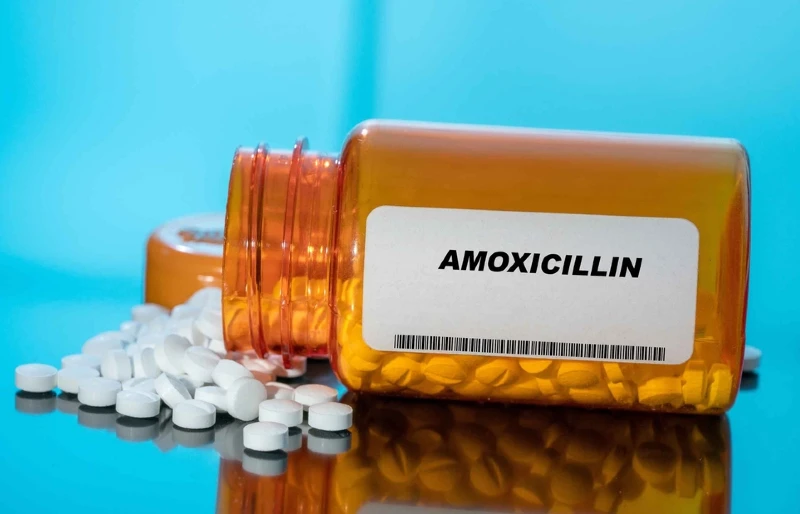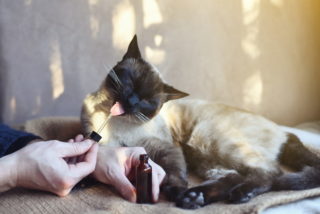Can Cats Have Benadryl? Our Vet Explains

Updated on

Click to Skip Ahead
Benadryl is an antihistamine drug that can be prescribed to a cat by a vet to treat allergic reactions or environmental allergies. It can also be used as a mild sedative, but in certain cases in cats, it can have a paradoxical effect and cause restlessness instead of sedation.
Do not give Benadryl to your cat before talking to your veterinarian because it can interact with certain medications.
In this article, you will learn more about Benadryl and what it is used for, if it is safe for cats, the recommended dose for felines, and the potential side effects.
What Is Benadryl?
Benadryl is a medicine for human use that contains diphenhydramine as an active substance. Diphenhydramine is a first-generation antihistamine that blocks the H1 histaminergic receptors. If such receptors are blocked, the reactions generated due to their activation by the histamine released by the cat’s mast cells will no longer occur. Benadryl can be recommended for pets by the vet to treat allergic reactions, allergies (e.g., caused by insect bites), or to prevent motion sickness, or vomiting. However, this medicine is mostly prescribed for environmental allergies.
- Extreme itching
- Excessive scratching and grooming
- Rash after flea bites (head, neck, abdomen, lower back, and legs)
- Hair loss/severe shedding
- Skin lesions (red and inflamed skin)
- Crusts or scabs
- Matted fur
- Vomiting
- Diarrhea
- Food avoidance
- Chronic ear infections (sometimes recurrent)
- Breathing problems (coughing, wheezing)
- Swollen face or eyes
Benadryl is available in the form of capsules, oral liquid, or liquid for injections. Be careful, however, because some liquid products may contain alcohol and should not be given to cats because they can get poisoned. Therefore, carefully read the information on the package first.
Benadryl is not FDA-approved for use in animals, but veterinarians can legally prescribe it as an off-label or extra-label medication.
Is Benadryl Safe for Cats?
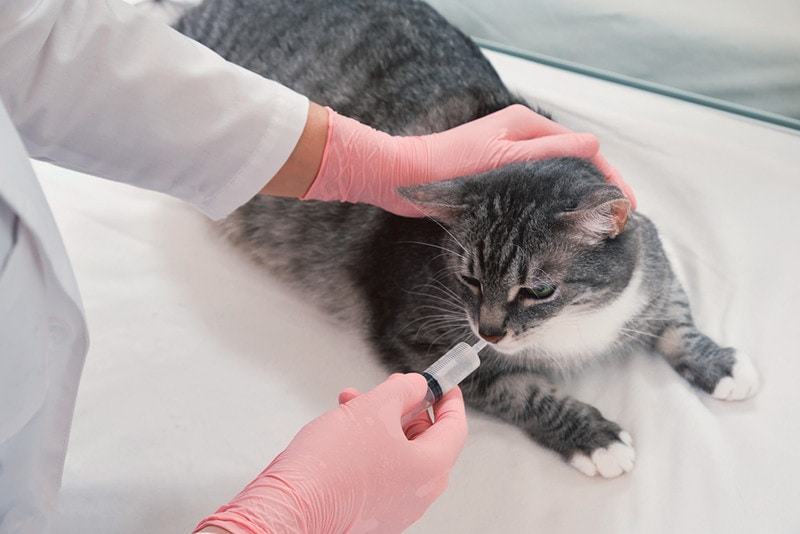
Benadryl (diphenhydramine) is considered a safe medication for young, healthy cats. However, it should only be administered as directed by the veterinarian.
If your cat shows clinical signs of an allergy (especially), take them to the vet for diagnosis and the correct dosage of Benadryl. Also, if your cat has an allergic reaction, do not administer Benadryl at home without first talking to your vet. Allergic reactions can represent medical emergencies and must be treated as soon as possible. Moreover, if you administer Benadryl before the vet evaluates your cat, this medication can mask the clinical signs of other conditions, and the vet can no longer make a correct diagnosis.
- Kittens less than 6 months old
- Pregnant cats
- Senior cats
- Cats suffering from chronic conditions, such as heart disease, thyroid disease, prostate enlargement, intestinal or bladder obstruction, chronic obstructive pulmonary disease, urinary disease, glaucoma, high blood pressure, or asthma
In short, cats can have Benadryl but not before you talk to the vet, as this medicine is not safe for all categories of cats. Moreover, Benadryl can interact with other drugs, such as:
- Anticholinergic drugs (e.g., atropine and glycopyrrolate)
- Tricyclic antidepressants (e.g., amitriptyline)
- CNS depressants (sedatives, anesthetics, and pain medications, e.g., benzodiazepines)
Also, inform the vet about any supplements that your cat is taking (vitamins, minerals, or herbal supplements).
What Are the Possible Side Effects of Benadryl?
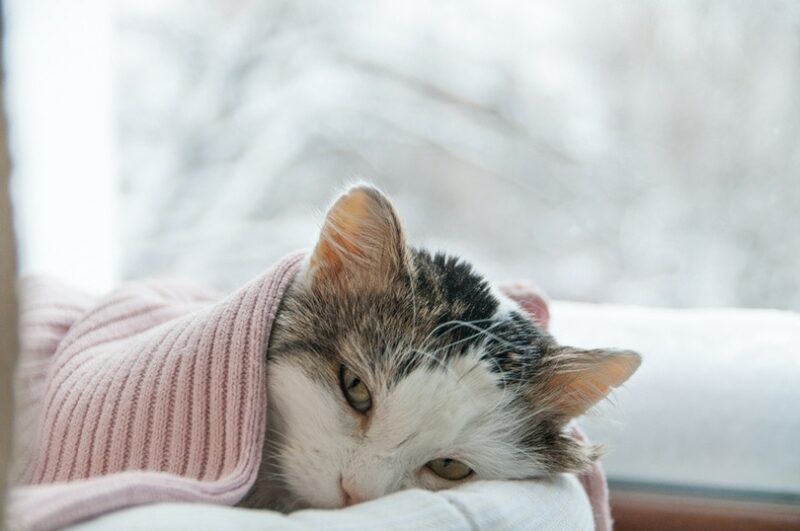
Like any other drug, Benadryl can cause allergic reactions in pets sensitive to the active substance (diphenhydramine). Clinical signs of an allergic reaction in cats may include:
- Sneezing
- Runny and itchy nose
- Itchy, watery, and red eyes
- Coughing
- Excessive salivation
- Lethargy and pronounced sedation
- Rapid breathing and heart rate
- Wobbly walking
- Urinary retention
- Swollen face and difficulty breathing (in rare and severe cases)
- Vomiting
- Diarrhea
- Decrease or increase in appetite
- Dry mucous membrane
- Excitement
In cats, Benadryl can have a paradoxical effect, and instead of sedating them (becoming lethargic), they can become agitated/restless. These side effects usually disappear on their own after 24 hours but may last longer in cats suffering from chronic liver and/or kidney diseases.
In case of overdose, diphenhydramine can cause breathing difficulties, seizures, coma, and even the death of your pet. For this reason, it is important to talk to your veterinarian before giving Benadryl to your cat.
What Is Benadryl Prescribed For?
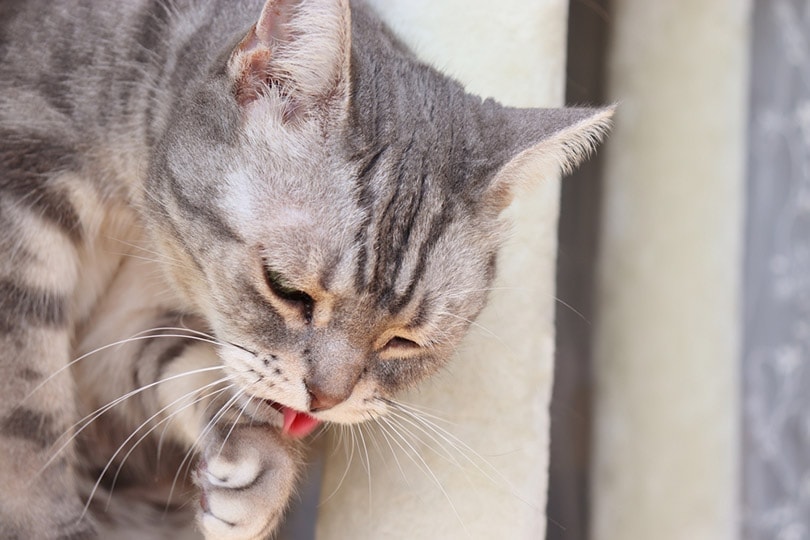
Mainly, Benadryl is recommended for cats with allergic reactions that occur after insect bites, as it is quite effective. In some cases, vets can recommend Benadryl for cats with environmental allergies. However, this medicine is not always effective for that situation, and the vet may have to try several anti-allergy (antihistamine) drugs until they find the one that works best for your cat.
- Motion sickness (e.g., for car rides)
- Mild sedation (though in some cats, it may have paradoxical effects)
- Vomiting
What Is the Recommended Dose of Benadryl for Cats?
Benadryl is not labeled for use in cats. For this reason, the dosage that your vet may recommend for your cat will often be a combination of the recommended dosage (0.5–1 mg/lb., once every 8–12 hours) and their practical experience.
Do not give Benadryl to your cat without talking to your veterinarian first because you can poison your pet by overdosing, which can result in severe side effects.
Avoid liquid formulas because they have an unpleasant taste for cats and may contain alcohol, which is toxic to pets. Also, do not administer unmarked tablets (i.e., on which the concentration is not labeled) because you risk an overdose.
Frequently Asked Questions (FAQs)
Is Benadryl the Best Medication for Cat Allergies?
The short answer is no. Although Benadryl can be used to treat the signs of environmental allergies in cats, sometimes this medication does not work. However, that doesn’t mean if Benadryl (diphenhydramine) doesn’t work, other antihistamines won’t work either. For these reasons, it is vital to take your cat to the vet for an evaluation when they show signs of an allergy.
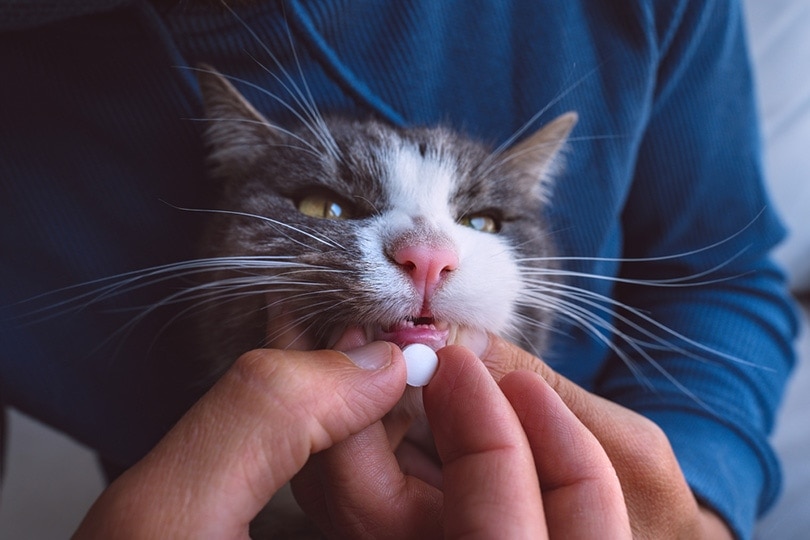
Why Does Benadryl Make My Cat Foam at the Mouth?
If your cat foams at the mouth after giving them Benadryl, know that this is not a typical side effect, but rather a clinical sign that your cat has ingested too much medicine. If the vet has recommended a certain dose and your cat is foaming at the mouth, tell them about this side effect so they can adjust the dose. Other clinical signs of Benadryl overdose in cats may include decreased heart rate, central nervous system depression, respiratory failure, vomiting, or seizures. If your cat shows these clinical signs after you have given them Benadryl, take them to the vet clinic as soon as possible because an overdose can lead to death.
Conclusion
If your cat is allergic to insect bites, your vet may recommend administering Benadryl in the early stages of the allergic reaction. Unfortunately, Benadryl in cats is not that effective, and moreover, it can be easily overdosed on. In addition to environmental allergies, Benadryl can be given to cats for motion sickness, mild sedation (though it can have a paradoxical effect), or vomiting. Some cats can be sensitive to the active substance (diphenhydramine) and develop allergic reactions.
Like any drug, Benadryl can have various side effects, such as dry mouth, sneezing, itchy skin, runny eyes and nose, lethargy, pronounced sedation, rapid heart rate and rapid breathing, wobbly walking, and others. Never give Benadryl without talking to your vet first, as an overdose can lead to your pet’s death. Benadryl is also not recommended for food allergies.
Featured Image Credit: EHStockphoto, Shutterstock





